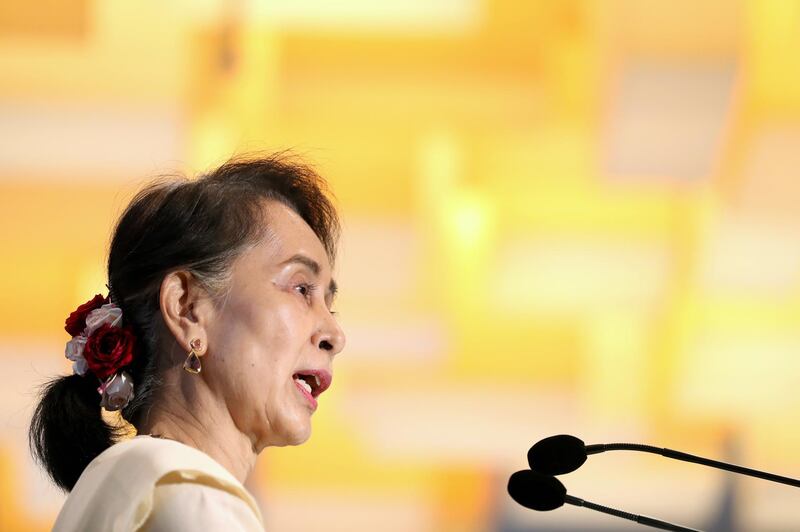Aung San Suu Kyi, Myanmar’s tarnished Nobel laureate, defended her nation’s handling of the Rohingya crisis in a speech on Tuesday, saying the speed of the minority’s repatriation is up to Bangladesh.
Myanmar’s civilian leader said the southeast Asian nation was ready to receive returning refugees. But rights groups criticised her for attempting to dodge responsibility for ethnic cleansing.
She appeared to blame Dhaka for the delay in repatriating more than 700,000 Rohingya who fled to Bangladesh from Buddhist-majority Myanmar amid a state-led campaign of ethnic cleansing against the mostly Muslim minority almost a year ago.
“It's very difficult for us to put a time frame on it by ourselves unilaterally because we have to work with Bangladesh in order to do that. The returnees have to be sent back by Bangladesh. We can only welcome them at the border,” Ms Suu Kyi said in a rare address to an international audience in Singapore, where she spoke on Myanmar’s democratic transition.
“Bangladesh would also have to decide how quickly they want the process to be completed,” she added.
But as The National reported on Tuesday, Bangladeshi officials say it is the intransigence of Myanmar's government that is leaving the Rohingya's fate in limbo.
The two countries signed a memorandum process on repatriation last November but have since failed to make progress.
Bangladeshi officials say they supplied a first list of 8,000 names of Rohingya refugees to be verified by Myanmar in February. Six months later, Myanmar has only verified some 2,000 from the list, Bangladesh says.
“We are always requesting the Myanmar side to expedite the process,” a Bangladeshi official, speaking on condition of anonymity as they were not authorised to speak to the media, said on Thursday ahead of Ms Suu Kyi’s latest comments.
_____________
Read more of Campbell MacDiarmid's reporting from Bangladesh:
[ 'I saw them with our women, doing whatever they wanted' ]
For the Rohingya, now at least, anger stops short of militancy
Rohingya find their voice in exile but not an audience
[ How the exiled Rohingya and endangered elephants learnt to coexist ]
_____________
Myanmar has not made significant progress in improving the conditions for returning refugees to their home state of Rakhine in western Myanmar. Rohingya living in the crowded refugee camps near Cox’s Bazar say they will only return home if they are granted citizenship, are recognised as an ethnic group, and their security is guaranteed.
But Ms Suu Kyi says Rakhine State is at risk of terrorism.
“The danger of terrorist activities which was the initial cause of events leading to the humanitarian crisis in Rakhine remains real and present today,” she said.
The latest campaign against the Rohingya – which the US and UN have called ethnic cleansing – began last August after a series of insurgent attacks on police posts.
Myanmar opposes international calls for justice and, on Tuesday, Ms Suu Kyi portrayed the events as part of the southeast Asian country’s growing pains towards democracy.
“We who are living through the transition in Myanmar view it differently from those who observe it from the outside and who will remain untouched from its outcome,” she said.
She avoided mentioning the Rohingya by name – Buddhist-majority Myanmar does not recognise the predominantly Muslim group as one of the its 135 official ethnic groups – but said: “Unless these security challenges are addressed, the risk of communal violence would remain”.
But observers said it was contingent upon Myanmar to investigate its own security forces as well as to create a conducive environment for safe return for Rohingya.
“Until the Myanmar government ensures accountability for the crimes perpetrated against the Rohingya and dismantles the system of discrimination and segregation that made them so vulnerable in the first place, they are not safe to return,” said Saad Hammadi, Amnesty International’s South Asia regional campaigner.
Previous experience suggests that the Myanmar government remains unwilling to grant Rohingya those protections, said Human Rights Watch researcher Richard Weir. “It is ready to bring people home but to conditions under which they previously lived, including systematic denial of their basic rights. None of that has changed”.
Ongoing persecution in Rakhine state is corroborated by newly fleeing Rohingya refugees – 11,000 of whom have arrived in Bangladesh this year. “They’ll tell you the situation is bad and getting worse,” says Mr Weir. “And no one has access on the other side to assess that.”
The UN, which maintains conditions are not yet safe for refugees to return, says it has been unable to access Rakhine State. Myanmar authorities have delayed authorisations for UN staff to visit and have only offered access to limited areas, Knut Ostby, the UN resident and humanitarian coordinator in Myanmar, told Reuters on Tuesday. “They’re standing ready to go when we have effective access,” he said.
On Monday, Human Rights Watch published a report documenting the torture by Myanmar authorities of six Rohingya who returned to Rakhine State.
In that context, Ms Suu Kyi’s comments were part of a Myanmar government campaign of “outrageous duplicity,” Mr Weir said.
“It’s a farcical portrayal of people wanting to return home and stay in Rakhine State,” he said.
“They’re torturing people they say they want to come back”.





